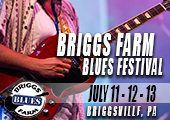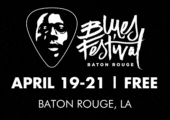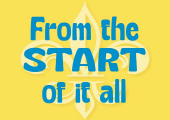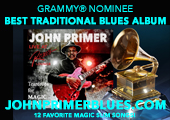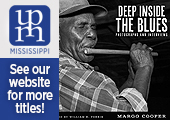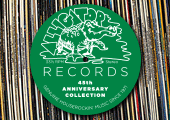BUDDY GUY
The Blues Don’t Lie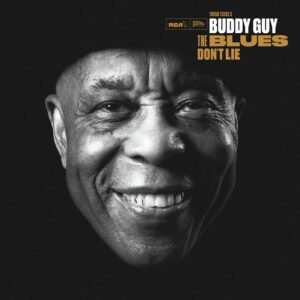
RCA/Silvertone Records – 19658-73152-2
The title of Guy’s electrifying new album is just right. In his sure hands, the blues never steer us wrong, never promise more than they deliver; in Guy’s hands, the blues deliver straight-ahead truths about life’s up and downs, and his incendiary guitar licks burn a hole in our soul and cleans us with their fire.
The opening song of the album, I Let My Guitar Do the Talking, jumps out of its grooves with smoldering horns and screaming wah-wah lead runs. In this propulsive track, Guy tells the story of his life, pulling no punches and doing exactly what the title promises—letting his Stratocaster do the talking. The title track features Guy’s crisp, piercing lead runs riding over Reese Wynans’ thrumming B3 strains and Mike Hicks’ and producer Tom Hambridge’s evocative background vocals. The song’s a haunting affirmation that the blues see straight down to the bottom of our souls and give voice to the roiling emotions of loss and death and unfulfilled love. The gospel-inflected chorus illustrates how thin the line is between the spirituals and the blues. The slow-burning blues The World Needs Love features Guy’s crying, aching lead lines playing call-and-response to Kevin McKendree’s stride blues piano, while the poignant We Go Back unfolds slowly, reliving through song the long history of racial injustice. On this song, Mavis Staples trades verses with Guy in her gritty vocals as they look back to how they got over even through times when “the blues was everywhere.” Well Enough Alone rides a Mississippi Delta blues vibe as the song opens before it launches into a hard-charging blues rock. Bobby Rush plays call-and-response with Guy on the juke joint Memphis blues What’s Wrong with That?, while Wendy Moten lends her soaring vocals to the striding, rocking and rolling House Party. Sweet Thing simmers on a slow boil of love and lust, while the jazz blues Last Call illustrates Guy’s deep musical versatility as it slides along with bright guitar and piano notes. The album closes with the acoustic blues King Bee, a spare and just-right ending to an album whose focus is the truthfulness that lies within the blues; this final song is as real as the blues gets.
The Blues Don’t Lie showcases Guy playing at the top of his game. This collection of songs allows Guy to stretch out and demonstrate his mastery of every style of the blues and it is bound to bring Guy another set of awards for his songwriting, singing, and guitar playing.
—Henry L. Carrigan Jr.
MUD MORGANFIELD
Portrait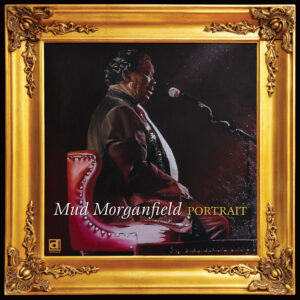
Delmark – 876
For Mud Morganfield’s first album on Delmark, the label has remastered Son of the Seventh Son, his 2012 studio debut, adding two new tracks: Praise Him, a gospel offering with a bluesy feel that Delmark issued as a CD single last year, and a version of Good Morning Little Schoolgirl originally recorded at the Son of the Seventh Son sessions in 2011 but not issued at the time.
Praise Him, which features Morganfield on both bass and vocals, is probably the most intriguing item here, both in terms of its sound and the jubilant feeling of release that he brings to it. The production is robust and roomy, the lyrics heartfelt, and Morganfield’s voice seems reborn, as if he’s finally claiming it as his own (the sometimes-eerie resemblance to his famous father, for which he’s been both praised and criticized over the years, is almost entirely absent).
The inclusion of Schoolgirl, though, shows that Morganfield is not about to abandon his core identity as a Chicago roots man channeling the spirit of Muddy and his legendary compatriots of the postwar blues era. It was probably a wise decision not to include this on Son—the vocals sound uncharacteristically labored, as if Morganfield had to strain to adapt his stentorian Muddy-esque bellow to the dancing, pop/novelty song–influenced sprightliness of John Lee Williamson’s melody and propulsive cadence (Muddy himself covered it on his 1964 Folk Singer album, which some critics have also castigated as a rather labored attempt to market him to the growing white audience that was embracing the blues as “folk music”).
At risk of mixing blues metaphors (and cliches), it seems as if Mud Morganfield is at a crossroads. His ability to peel back the years and make us feel as if we’re in the godlike presence of one of the 20th century’s most revered musical geniuses is beyond dispute; in fact, it’s become both his identity and his calling card. But Praise Him indicates that there’s another Mud Morganfield waiting to be fully born: an adventurous stylist with new ideas—musically, lyrically, vocally—ready to remake the music his father helped codify, just as his father remade the music of Son House and Robert Johnson, in the process revolutionizing the blues and, eventually, American popular culture itself.
—David Whiteis
JOHNNY RAWLS
Going Back to Mississippi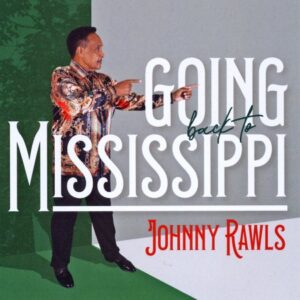
Third Street Cigar Records – No #
Johnny Rawls has deep Mississippi roots. Born and raised near Purvis, Mississippi, he developed proficiency on a number of instruments, and by his 20s Rawls had joined O.V. Wright’s band as guitarist. Rawls would go on to serve as Wright’s music director, and after Wright’s passing in 1980, Rawls kept the group going as the Ace of Spades Band, touring and backing a wide array of revered blues figures.
Rawls began a recording career under his own name with the 1996 release Here We Go. Since that time, Rawls has continued to release albums at a regular pace, averaging nearly one per year. His style is a hybrid of blues and soul, and his original compositions—more than 100 to date—explore that approach.
Around the time of the release of his 2002 album, Lucky Man, Rawls was featured on the cover of LB #162. His 2011 album, Memphis Still Got Soul, was named best new southern soul recording in LB’s Critics’ Poll, and he’s been nominated for several BMAs. His 2018 release, I’m Still Around, won a Blues Music Award and was also named LB’s southern soul album of the year.
Now, in late 2022, Rawls returns with his fourth release for Third Street Cigar Records, a tiny independent label based in Ohio, and the project brings him full circle. Going Back to Mississippi is an authentic and heartfelt collection of southern soul. Backed by a supple and sympathetic core band, Rawls is out front on vocals, singing ten originals.
Recorded in Denmark and Ohio, the album features effective use of a tight horn section. Rawls and co-producer Alberto Marsico ran the sessions in an uncluttered manner, giving the recordings an immediacy, a you-are-there feel that serves the songs well.
Love is at the core of Rawls’ lyrics; it figures into the titles of three tracks (Your Love, Amazing Love, and Love Machine), and it looms prominently in the subject matter of many others. A first-person tale of you’re-gonna-want-me-back, Reap What You Sew [sic] is among the strongest cuts on the release. The lead guitar lines are clean and spirited, adorning but never overwhelming the arrangements.
The album’s title track is propulsive, its passionate rock energy enhanced by Marsico’s gurgling clavinet. If You Ever Get Lonely is a romantic, ’70s-style slow jam of the first order, reminiscent of Curtis Mayfield and the Impressions’ I’m So Proud. Rawls’ raspy vocal texture adds just the right amount of grit to the smooth proceedings.
I Got It is one of the album’s few tracks that makes use of backing vocals, and even then, it’s done in subtle fashion; this is clearly Johnny Rawls’ show. And that’s how it should be. Variety is a key to the creative success of Going Back to Mississippi; each song has its own character. Rawls’ guitar and voice serve as the glue that holds the entire project together. Rawls may be into his 70s, but the man is clearly at the top of his game.
—Bill Kopp
ANGELA STREHLI
Ace of Blues
New West Records / Antone’s Records – ANT 2513
In the roll call of great Texas blues singers, Angela Strehli occupies some rarified air. The Lubbock, Texas–born singer was at the center of the 1970s and ’80s blues revival that put Austin on the map.
While Strehli’s recording catalog of six solo albums may be a bit slim, her outsized impact on not just Texas blues, but the genre as a whole, can’t be overstated. At a time when there were precious few women mining the blues, her talent, swagger, and ability to lend a smoldering, rough-edged, yet emotional touch to any song allowed her to cut through the prevailing male-dominated ecosystem to forge a career as a first-call live performer.
Ace of Blues, Strehli’s first album since 2005’s Blue Highway, lends her wonderfully rich and nuanced pipes to 11 of her favorite covers and one heartfelt original.
Shortly after Strehli—who now lives in California—arrived in Austin in the mid-’70s, she met famed club owner Clifford Antone, who enlisted her help in establishing Antone’s, the world famous blues haunt that’s still alive and well today. The collaboration afforded Strehli the opportunity to perform with a who’s who of blues artists, such as Bobby “Blue” Bland, Muddy Waters, Little Milton, Stevie Ray and Jimmie Vaughan, Lou Ann Barton, B.B. King, Albert Collins, and the list goes on. She also fronted her own band, Southern Feeling, for a spell.
Backed by some killer players, including Mike Schermer (guitar), Jim Pugh (B3), Steve Ehrmann (bass), Mike Emerson (keys), and Kevin Hayes (drums), and with powerful horn arrangements by Rob Sudduth (tenor sax), Strehli applies her immense vocal skills and penchant for tackling challenging songs, as evidenced by the opener, Two Steps from the Blues. Made famous by Bland, it’s a testament to vocal restraint and impeccable phrasing, and she totally nails it.
Grooving shakers, like Elmore James’ Person to Person, Little Milton’s More and More, Otis Clay’s Tying to Live My Life Without You, and the soulful boogie of O.V. Wright’s Ace of Spades, clearly show that Strehli loves every song chosen for this outing and took great care in giving them the Midas treatment they deserve.
She even manages to capture the power and larger-than-life presence of Howlin’ Wolf on Howlin’ for My Darling and conjures the sprawling, menacing spirit of Waters on I Love the Life I Live. In the extensive liner notes, Strehli recalls how she helped a young Stevie Ray Vaughan develop his vocal chops, and on the album’s lone original side, SRV, she pours her heart into every syllable on the tender ode to the late great Texas axe man.
Here’s hoping it won’t be another 17 years before Strehli gives us another taste of her vibrant, versatile, and joyful expression of the blues.
—Rod Evans
RORY BLOCK
Ain’t Nobody Worried
Stony Plain Records – SPCD1468
Ain’t Nobody Worried, Rory Block’s heartfelt tribute to some of the finest women in music, is inspired by the home concerts she performed during the pandemic. While performing two broadcasts a week, Block eventually exhausted her repertoire of blues and folk tunes. She decided to turn toward the music of the 1960s, ’70s, and ’80s. When Block entered the studio with producer Rob Davis, she sought to recapture the joy she and her audience felt as they celebrated great songs from decades past.
Several soul and R&B covers show just how much passion and energy Block bought to these sessions. On the Staple Singers’ I’ll Take You There, well-placed slide licks and finely strummed 16th notes power the arrangement. Block’s effusive, flowing vocals are sure to get listeners’ feet tapping. In the liner notes, Block refers to Gladys Knight and the Pips’ Midnight Train to Georgia as “one of the most soulful songs of all time.” The beloved soul classic works surprisingly well with an acoustic arrangement. As she sings the familiar lyrics, Block’s vocal range is stunning. She goes from sultry purrs to piercing high notes in a heartbeat.
A stripped-down arrangement and relaxed tempo offer a distinctive take on Tracy Chapman’s hit Fast Car. Block’s mournful slide guitar licks are a perfect companion to the tune’s aching lyrics. It’s no surprise that Bonnie Raitt’s Love Has No Pride appears on an album that celebrates great women of song. Block’s love and admiration for Raitt are obvious as she pours her heart into the vocals. Block’s beautiful vibrato and expert sense of dynamics bring Raitt’s lyrics to life. Lovin’ Whiskey is the only one of Block’s own songs on this collection. Block outdoes herself as she performs the song that put her on the map. Soul-baring vocals and sublime guitar work make this track one of the album’s high points.
Warm and intimate, Ain’t Nobody Worried makes listeners feel as if they are sitting around a campfire with Block and her guitar. It’s a pleasure to hear Block pay tribute to the women who have inspired her and countless other musicians.
—Jon Kleinman
VALERIE JUNE
Under Cover
Fantasy – FAN01839
As Valerie June’s universe expands, her star continues to rise. Her 2021 album, The Moon and Stars: Prescriptions for Dreamers (see LB #275), received critical acclaim and earned the Humboldt, Tennessee, native her first GRAMMY nomination—for Best American Roots Song for Call Me a Fool. Now a published author, her second volume, a children’s book titled Somebody to Love: The Story of Valerie June’s Sweet Little Baby Banjolele, is due later this year from Third Man Books.
Not resting on these laurels, June has also released a new EP of music. On Under Cover, the songwriter and multi-instrumentalist turns her attention to favorite compositions by others. These eight covers span genres from folk and country to alternative rock and modern soul, her choices acknowledging artists who’ve influenced her bewitching brew of roots music.
At a glance, some songs seem tailor-made for June. Her stacked vocals on Gillian Welch’s Look at Miss Ohio imbue the sly lyrics with a sweet wistfulness. The symphonic country rock of Joe South’s Don’t It Make You Want to Go Home gets a jolt of down-home soul, the Stax-esque horns a nod to her Memphis-area roots. On Tonight I’ll Be Staying Here with You, her willowy, oboe-like voice swoops and soars along with Dan Iead’s pedal steel, capturing the playfulness and joy at the heart of Bob Dylan’s original Nashville Skyline version.
In this context, Frank Ocean’s Godspeed might seem like a surprising choice, but in her hands (and those of Treya Lam, the pianist and backing vocalist), the futuristic soul anthem becomes a gentle gospel prayer. A tender reading of Nick Cave’s Into My Arms concludes the EP; with just Dave Sherman’s keyboards to accompany her, it serves as a sweet, reverent benediction.
On Under Cover, Valerie June reveals she’s as adept a stylist as she is a songwriter, interpreting the songs of others in her own eclectic, luminous way.
—Melanie Young
JOANNE SHAW TAYLOR
Nobody’s Fool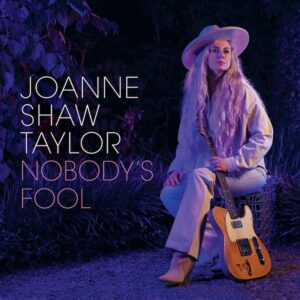
KTBA Records – No #
On the first track of her new album, Taylor gets right down to business on the rollicking, striding, take-no-prisoners title song. The cut opens with a sonic echo of George Harrison’s My Sweet Lord before launching off into a straight-ahead rocker, propelled by Taylor’s hard-charging lead runs and her husky vocals. The opening track sets the bar for the rest of the album while introducing the narrative arc that takes us through loss, love, and hope.
The echoing, haunting minor chord—worthy of the best of Danny Kirwan’s Fleetwood Mac—Bad Blood swirls around Taylor’s piercing lead runs on the instrumental bridge, detailing the reasons for the end of a relationship. The shimmering and bright pop-inflected Won’t Be Fooled Again belies the defiance of the singer, who testifies that she won’t let herself be taken in again by a lover who won’t live up to their words. The tender piano ballad Fade Away spirals ever upward with transcendent vocals, lifting into the somber, yet vibrant, strains of a cello on the song’s outro. The propulsive Then There’s You is a straight-ahead rocker that highlights Taylor’s gritty blues rock lead runs and her towering vocals, while Runaway opens with sonic riffs from Dave Mason’s We Just Disagree before evolving into a jazz rock gem that glitters with every facet of the tune. The album closes with the Muscle Shoals soul slider New Love, replete with blaring horns, fluid, crunchy guitars, and Taylor’s soaring vocals. It’s an affirmation that love can be new again even after the loss of a relationship gone sour.
Nobody’s Fool secures Taylor’s place as a canny songwriter and a guitarist and singer who pulls emotion out of every riff she plays and every phrase she sings.
—Henry L. Carrigan Jr.
THE GROOVE KREWE FEATURING NICK DANIELS III
Run to Daylight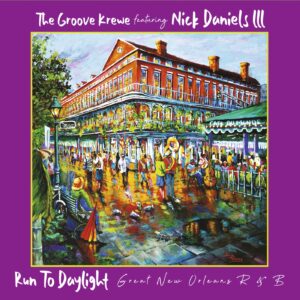
Sound Business Services – SBS (2751-3)
New Orleans bassist and vocalist Nick Daniels III has been a mainstay on the city’s music for years, boasting extended tenures with both the Neville Brothers and Dumpstaphunk. Run to Daylight is his first recording as a solo artist, and he has quite the arsenal of musical support behind him. Producers and songwriters Rex Pearce and Dale Murray, who have worked with Louisiana’s LeRoux as well as on film and television projects, are the architects of the recording, assembling a large roster of studio musicians and contributing the ten original compositions that make up the album’s program. Daniels is a commanding, in-the-pocket bass player, so it’s a bit disappointing that his bass work is only featured on four tracks; however, top-flight veteran bass player David Hyde (Bobby Charles, Gatemouth Brown, etc.) takes over on the balance of tracks. So, it seems that Pearce and Murray want to showcase Daniels as a singer, and he doesn’t disappoint with his strong, deep resonant voice, delivering the lyrics with a fiery conviction.
While some of the material references the New Orleans and Louisiana milieu (That’s New Orleans, Where Ya at in Life, Raising Cane on the Bayou), the music itself, which is skillfully played and produced, doesn’t really capture the swampy funk sound that distinguishes that regional music. The backing tracks are a little bit too slick and missing that greasy groove and percolating syncopation that Daniels has been so adept at with the Nevilles and Dumpstaphunk. It’s understandable that he wants to stake out a personal approach, but the music on Run to Daylight has him singing over highly polished but not particularly distinctive funk-driven R&B. Daniels’ vocals are strong enough to genuinely elevate some of the songs. The opening title track features a swaggering vocal that is highlighted by Jonathon “Boogie” Long’s crackling guitar fills and is propelled by punchy horn lines from Jason Parfait and Ian Smith. Daniels excels in the stripped-down funk of In the Groove Zone, and his emotive vocal brings alive life in Southwest Louisiana on Raising Cane on the Bayou that rides on a groove that evokes the blend of blues, funk, and rock that has been so effective on Shemekia Copeland’s recent releases. The highlights of the set are two numbers that place Daniels’ voice in classic R&B settings. He cuts loose like a Stax soul shouter on I’m Gonna Prove My Love and imbues Sweet Situation with a seductive Motown lilt. Run to Daylight proves that Nick Daniels III has a lot to offer, and hopefully he’ll continue to evolve as a solo artist and find a way to anchor a distinctive approach in his hometown traditions.
—Robert H. Cataliotti
BREEZY RODIO
Underground Blues
Wind Chill / Bloos Records – BLO-15
Breezy Rodio clearly knows his way around a riff. With a career that began in earnest when he was recruited for guitarist Linsey Alexander’s band, he rapidly advanced to the forefront of that outfit before subsequently segueing into his own position of prominence courtesy of his debut album, 2011’s aptly titled Playing My Game Too. His sophomore set, So Close to It, released in 2015, helped further his fortunes, climbing its way to the top of the blues charts and making it clear he needn’t play second fiddle to anyone.
Various other albums followed, which makes it no surprise that with this new offering, Underground Blues, Rodio further affirms that he’s not only a pervasive performer, but an evocative songwriter and expressive instrumentalist as well. His taut guitar leads are underscored by the immaculate arrangements emblazoned in each of the album’s 14 songs, all decidedly demonstrative and flush with the authority and agility so essential in terms of both power and prowess. Producer Anson Funderburgh can take some of the credit of course, but Rodio’s emotive delivery, whether on the slow blues of Sugar Daddy, Bluesoned, Lightning Strike, and Gerry Told Me, or through the fiery finesse of The Murder, That Damn Cocaine, and C.H.I.C.A.G.O., always allows him to get in a groove.
So too, on tracks such as The Asymptomatics, Let Me Go, Why Did You Go, and Hello Friendo, the ever-shifting sway of Underground Blues in particular, the music coasts along with absolute insistence and assurance. They’re the kind of pervasive performances that resonate even after a single encounter.
At this point in his career, Rodio clearly resides on his own individual plateau. His stinging and sizzling guitar licks illuminate each entry, while his authoritative vocals leave no doubt as to who commands center stage. A tough, tenacious, and solid set of songs, Underground Blues ought to be the vehicle that elevates Rodio to even greater glories.
—Lee Zimmerman
RUTHIE FOSTER
Healing Time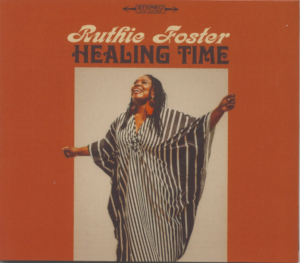
Blue Corn Music – BCM2202
It’s the rare artist capable of creating a body of work that transcends genre. True, Ruthie Foster has been recipient of many, many awards in the blues idiom. Foster has won Blues Music Awards in all but two years between 2010 and 2021 (and was a presenter in 2020). She’s a three-time Grammy Award nominee and has been nominated for several Living Blues Awards.
To the uninitiated, all of those accolades might well suggest that Ruthie Foster has “found her lane,” so to speak, and that her music fits neatly into the blues category. The truth is far more nuanced and rewarding. As exemplified on her 12th and latest album, Healing Time, Foster’s music is rooted in the blues tradition, but extends so far beyond its confines as to make genre distinctions meaningless.
Soul Searching has subtle instrumental nods to the Staple Singers, and it’s pleasantly reminiscent of early ’70s Carole King. Lie Your Way to the Truth has hints of windswept, spaghetti western soundtrack music. What Kind of Fool is soaring, sweeping soul. I Was Called is stirring gospel; the robed chorus singers will be vivid in the listener’s mind.
There’s an unmistakable devotional undercurrent to the music on Healing Time, but it’s all presented in a way that doesn’t require the listener to subscribe to any particular set of spiritual beliefs. And in keeping with the astounding variety that characterizes the album, Foster shifts effortlessly between styles. Don’t Want to Give Up on You is a love song, plain and simple. Its rock-solid soul/R&B groove shines brightly.
The album’s title track is a supercharged, upbeat extravaganza. The jubilant quality of the song is positively contagious, a thrilling track in the tradition of Aretha Franklin. The airy For You shifts gears yet again, this time in the direction of sleek and soulful R&B. Love Is the Answer offers more inspiring lyrical messages, with swoon-worthy backing vocal work and some tasty chromatic harmonica that channels young Stevie Wonder.
Keening slide guitar adorns Finish Line, a tune with sterling pop values. And as its title suggests, the album closer, 4am, is a quiet, contemplative piece that invites the listener to reflect on the positivity that marks the uplifting album as a whole.
The CD’s liner notes helpfully list the personnel involved, but if a powerful magnifying glass isn’t handy, most listeners will find the three-point type completely inscrutable. Suffice to say that while Foster doesn’t need to enlist the talents of some of music’s top players (Robert Randolph and Sonny Landreth, to name two), their presence on Healing Time is wholly consistent with its emphasis on heartfelt quality.
The sparkling production values of every track on Healing Time highlight the sublime quality of Foster’s voice. The arrangements are finely tuned and multi-layered, yet the individual sonic elements never call attention to themselves. Everything is placed in the mix in service to the overall goal of showcasing the songwriting and vocal work of this superb artist.
—Bill Kopp


